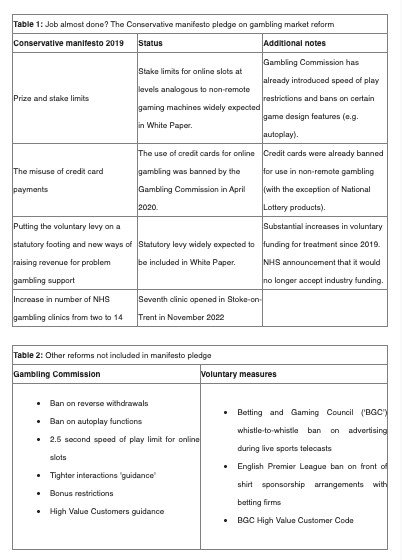As the end of April dawns, UK gambling’s purgatory may soon be over. Regulus Partners reflects on the winding journey of the Gambling Review and how its original mandate was altered by backdrop of chaos across the government’s ranks.
After more false dawns than the Carnival of Las Palmas, it seems that the publication of the Government’s White Paper on gambling market reform may now be upon us.
When the review was first announced, during the final weeks of the last decade, Boris Johnson was Prime Minister, the world had not heard of Covid-19, and Matt Hancock’s tastebuds had yet – we assume – to savour the delights of cow’s anus. Back in November 2019, Mr Hancock was still the Secretary of State for Health and Social Care (‘DHSC’) – and it was he, rather than the Culture Secretary, Nicky Morgan who announced the review as part of a cross-department addictions manifesto pledge that has yet to materialise.
With the DHSC distracted by rather more pressing matters, the Department for Culture, Media and Sport picked up the reins in 2020 and finally published its call for evidence in December of that year. In so doing, it expanded the review’s scope – taking what had been an exercise in legislative tinkering and turning it into the first root-and-branch review of Britain’s gambling laws for two decades. This was the high point. The DCMS call for evidence was considered, far-reaching and clear about its purpose.
The review was to be an exercise in legislative and regulatory modernisation to ensure appropriate protections for vulnerable people while preserving the freedoms of adult consumers to get their legitimate kicks within sensible parameters. The department received 16,000 responses and indicated that a White Paper outlining reforms would be published the following summer.
What happened next reflects poorly on most of the major stakeholders involved in the review. Successive Prime Ministers proved themselves constitutionally incapable of leaving the ministers responsible in post long enough for them to grasp the complex issues that the review encompassed.
The DHSC attempted to corrupt the process through a Public Health England and Office for Health Improvement and Disparities campaign of anti-gambling propaganda (supporting a hidden agenda for the imposition of tobacco-style controls on betting consumers – see our structured critique of the PHE-OHID reports). The Gambling Commission, acting at times more like a public health activist group than a market regulator, sought to undermine the process through its attempted putsch on ‘affordability checks’ (and its more recent go at subverting the Gambling Act by labelling all gambling consumers ‘vulnerable’).
Academic researchers illustrated the extent to which the principles of the Enlightenment have now been abandoned within the social sciences – replaced by the intolerant ideology of Critical Social Justice. Vast sums of money have been expended on wasteful lobbying by the industry and anti-gambling activists alike. It is a tragedy that – with a few notable exceptions – problem-solving has taken a back-seat to argument-winning over the course of the last two-and-a-half years.
It did not need to be this way. Writing shortly before his death last year, Professor Peter Collins (who served as an adviser to Parliament during the progress of the Gambling Act 2005) observed: “By 2020 Government had decided it [gambling legislation] all now needed to be reviewed again without however, having determined what went wrong last time, let alone what really needs to be done genuinely to promote the public interest”. He added that “Government also seems to be catering to a combination of new moral puritanism and bureaucratic greed disguised, quite fraudulently, as a concern for ‘public health,’ buttressed by disgracefully and demonstrably bad ‘scientific research’.”
If the rumour mill runs true, we will shortly discover what sense (if any) a continually disrupted and perpetually fibbed-to DCMS has made of all of this. It seems likely that it has now abandoned its once grand plans and that the White Paper will more closely resemble Hancock’s half-hour of tinkering than Nigel Huddleston’s ambitious programme of review and reform (see table 1, below).
The White Paper is, of course, simply a staging post rather than the final destination. Those hoping that it will bring a return to quieter and less uncertain times are likely to be disappointed. While the DCMS would dearly like to move on, the Public Health Establishment (which includes the DHSC, the British Medical Association and the Gambling Commission) is unlikely to be content with mere tinkering.
Should the White Paper generate several separate consultations on disparate issues rather than a coordinated review, the likelihood that political agendas will beat evidence-based policy will also materially increase, in our view, by facilitating the strategy of divide and conquer that these stakeholders are already effectively employing against a divided and sometimes poorly represented industry.
Peter Collins described the process which gave birth to the Gambling Act 2005 as “a story of large numbers of intelligent people devoting a great deal of time and energy to the sensible project of reforming UK gambling law and yet winding up with a law that everybody recognises is radically defective…”. It seems reasonable to expect that a similar verdict may, in time, be delivered on the British Government’s latest attempt at legislative modernisation.










